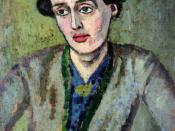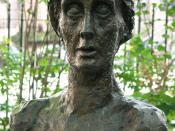In what sense might Virginia Woolf's novel ' To The Lighthouse' be understood as a feminist text?
When looking at To The Lighthouse we see the conventional usage of feminism's challenged. Woolf uses many different styles and techniques, and although the term feminist is never used within the novel, it clearly is a feminist text. Woolf's work challenges representation and treatment of women; and the social relationship between men and women, this is shown most poignantly within the novel To The Lighthouse. I intend to investigate the usage of feminist writing within this text.
Mrs. Ramsay and Lily Briscoe are the two main female characters in the novel. Women, Mrs. Ramsay believes are there to care for others, marry people off and harmonize everyone. They are also there (shown within her inner monologue) to protect men, and to nurture their ego.
'She had the whole of the other sex under her protection; for reasons she
could not explain, for their chivalry and valour.'
(13. To The Lighthouse.)
To The Lighthouse is a novel that is fascinated by women, as the perspectives of Mrs. Ramsay and Lily are the most fully developed narratives within the text. Woolf's To The Lighthouse asks the question of the sexuality of women, and questions the women's role within the family. Lily does represent Woolf's 'ideal women' and Mrs. Ramsay in direct contrast is portrayed as the 'angel of the house.' Woolf's essay 'Professions For Women' attacks Victorian institutions, she writes about 'killing the angel of the house', which she successfully manages through Mrs. Ramsay's death in To The Lighthouse. Mrs. Ramsay is a product of the Victorian era, she is described in terms of delicateness of feminity and Woolf, romanticizes her and uses passive language to portray her. Woolf's theory...



Well written
this essay has a good topic and strong information to back up the thesis. it is well written and shows the ideas of the author well
4 out of 4 people found this comment useful.